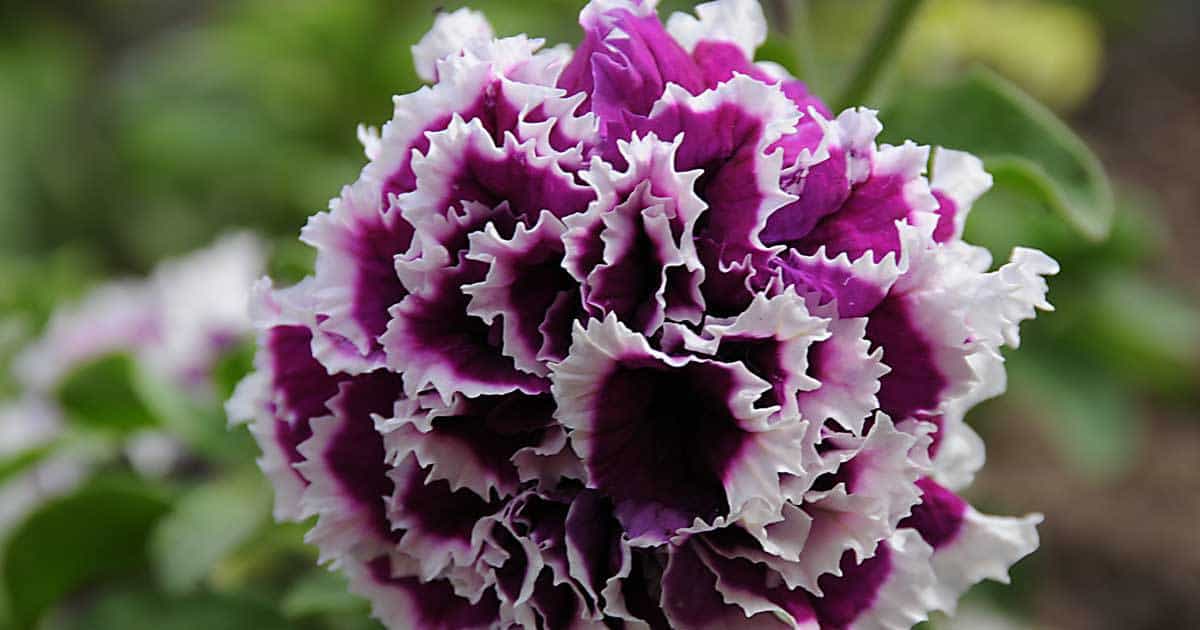The double Petunia, from a small beginning, has developed into a fabulous flower that puts on a spectacular show all summer.
The double varieties now available are remarkably big and rank with some of the most beautiful subjects in the garden where, for a riotous splash of color and a glowing display, they are second to none.

As cut flowers for long-lasting arrangements, double petunias are supreme.
Colors are various and equally lovely, arranged in a rich, luxuriant mass or as points of accent with longer stemmed trumpet-shaped flowers.
Perhaps double petunias (botanical name: petunia x hybrida) is not as easy to grow as zinnias or marigolds but they’re worth a little extra attention.
Only the single hybrids can hold a candle to them for a continuous display of rich bloom. Learn more about –> Growing and caring for Petunias.
When they first arrived, the vigor of double varieties was in question. Gardeners mistakenly believed being in double was associated with weakness and slow germination. This is not true.
Most modern all-double petunias are true hybrids. Today most commercial plants are equally vigorous, and the flowers are uniformly full double, large, and well fringed.

Such varieties are produced by crossing unrelated strains, one of which is a true-breeding small-flowered line and the other a true-breeding large-flowered line. Thus the resulting large-flowered double varieties have maximum hybrid vigor.
Many gardeners buy double wave petunias from specialists and, perhaps, this is more economical when only a dozen or so plants are wanted.
In getting them from such sources, it’s best to deal with reputable firms that will guarantee the varieties and colors specified.
It is also better when buying from garden centers to shun plants with a bloom or two already open on a tall, starved, spindly plant. Young, vigorous plants are more desirable for transplanting purposes.
Double Petunia Varieties
For success in double petunia care and growing, choice varieties are essential. Those known to produce uniformly large flowers should be chosen, and mixtures should be avoided unless they are from a reliable grower.

There are two types of petunias: Grandiflora and Multiflora.
Grandiflora petunia blooms large trailing flowers perfect for hanging baskets, window boxes, and containers.
Multiflora petunias possess smaller but more abundant flowers. As they are more tolerant to rain, they serve as ideal plants for summer bedding or mixed borders.
We recommend the following varieties:
- Sugar Daddy – produces double purple flowers adorned with dark veins.
- Rose Star – blooms rose-pink petunia flowers with a white center.
- Carpet Series – ideal for ground cover with a wide variety of colors.
- Calibrachoa – also known as million bells, grows vigorously at an amazing rate.

Propagating Double Petunia Seeds
Double flowers petunia seed is no more difficult to germinate than any other but is more expensive.
All hazards, therefore, should be eliminated so that as many seedlings come up as possible.
A dollar packet of seed should furnish plants enough for two or three average gardens if handled with reasonable care.

Because the seed is so fine, any double petunia plant is better started in a greenhouse, hotbed, or sunny window and then transplanted to a permanent location. The important thing to watch is moisture.
Petunia seeds will quickly germinate with a steady, regular water supply and temperature above freezing. The time required is controlled by temperature.
At 60° degrees Fahrenheit, the seed will germinate in slightly more than two weeks.
Care For Double Petunia Plants

- You don’t need to water double petunia plants as these are heat tolerant. Once a week of watering will satiate their thirst unless your area usually experiences a prolonged drought season. On the other hand, hanging baskets and containers require frequent watering.
- Plant petunias in well-drained soil. Too much water will give you lots of stems and lesser flowers.
- Double flowered types need biweekly fertilizer doses. A time-release fertilizer makes a great solution to ensure perfect growth.
- Petunias love direct sunlight but can also do well in partial shade.
- As the seeds need to germinate, do not cover; just sprinkle them on top of the soil. Warmer weather helps them germinate faster.
- Petunias can adapt to a wide array of soil pH. However, they don’t like cold climates, and they don’t want to stay dry for longer periods.
- Keep petunia warm indoors during winter. Although they like cool weather, they cannot tolerate frost.

Recommended Reading
by C Weddle